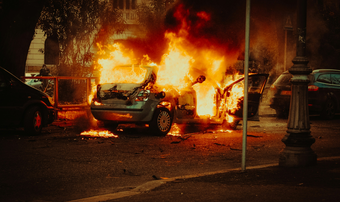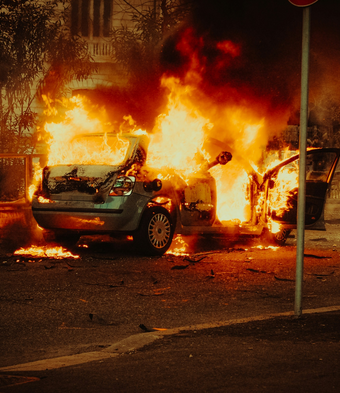Why the reaction to the sex education ban betrayed our political immaturity

Politics has a politics problem. It is a striking feature of contemporary British politics that the political establishment is quite so regularly aghast to see ‘politics’ taking place. Or to put it in other words, the political commentariat often seems simply unable to compute that people disagree, often quite vehemently, about life, the universe, and everything.
Take for example this, rather funny in my opinion, campaign advert from the Green Party a few years back. At its core, the video takes aim at the pettiness of politics of the period (2016) through the use of children, acting as politicians, quarrelling in the playground. At one level, I have some sympathy with this stance and have written in the past about how often politics focusses on petty squabbles at the expense of focussing on the task at hand, running the country.
Yet, there is something also quite troubling hidden between the lines, for the video doesn’t simply take aim at the pettiness of politics (the backroom deals, the egotistical personality clashes, the posturing and the blustering) but at the very concept of politics itself, at the art of disagreeing, of compromising, and of navigating all the facets and strands of public life in service of public justice and the common good.
Yes, governing is better than squabbling (we are fans of good government after all), but implicit in the call for ‘grown-up politics’ is the idea that the path forward is obvious, simple, and easy. Put the grown-ups in charge and all will be straightforward, we don’t need to do that nasty disagreeing stuff, all that’s needed is a sensible pair of hands who can end poverty, stop war, fix the environment, and provide good health care.
“Well, they’re not bad aims…” I hear you say. No, they’re not, but they’re far from obvious, simple, and easy.
Take for example the environmental cause. In recent years, environmentalists have led a hugely successful campaign to put the environment front and centre in the political debate. Environmentalism has been championed and welcomed by every political party, Net Zero enshrined in law, and the cause widely supported amongst the general population. You might argue if anything looks simple and straightforward and unbecoming of politics it’s this.
However, since the passing of Net Zero under Theresa May, the environment has become an incredibly divisive issue, sparking popular revolts (of both left and right) across Europe, been at the forefront of the recent mayoral campaigns, and seen the happy consensus begin to break down with politicians of different stripes rowing back from a full and wholesome embrace of the environmental cause.
The ’grown-up politics’ lobby see this as the stoking of a culture war, the inflammation of minor quibbles by politicians eager for political gain. Again, there is some truth in this but again is this really the obvious, easy, and simple issue it is made out to be? One can be united that humanity ought to have a better relationship with the environment and yet disagree on what that means for how the UK ought to be governed and our lives be led. After all there are choices to be made which have costs and trade-offs.
It is the job of politics, and politicians to consider these costs and trade-offs, to make decisions charting a course between them. Disagreements and difference are not a bug of the system but a feature, the question then is how best to manage them, rather than how to solve them.
However, what happens in reality is a mix of emotional obfuscation that aims to delegitimise the very act of disagreement itself or great intellectual dishonesty/naivety which portends that actually little difference and disagreement exist, and we all agree really, or at the very least, we agree about the important things.
Both of which were on display this week as the government waged into the ‘debate’ (or ‘started an unnecessary fight’ depending on who you listen to) around not one, but two issues: The teaching of Relationships, Sex and Health Education (RSHE) in schools, and the wearing of rainbow lanyards in the civil service.
In both situations, the government’s fundamental argument rested on the assumption that the teaching of RSHE and the wearing of rainbow lanyards has a political dimension. With regards to RSHE this focussed mainly on the question of what is appropriate to teach to whom, at what level, and at what age. The main headline proposal is that sex education will not happen before Year 5, or age nine.
The debate about lanyards, whilst expressed in an unnecessarily cack-handed and goading way, was about whether it is appropriate to champion a political cause, however subtly, through the choice of one’s lanyard at a theoretically ‘neutral’ institution such as the civil service.
Both questions have a hundred and one different answers and opinions depending on your point of view, the evidence you’ve looked at, and your vision for the public square and the purpose of human life. Now, this is not to say that all hundred and one of those different answers are equal in their value, but it is to say that difference is a fact of life in the public square.
The RSHE guidance announced this week is subject to a 9-week consultation and came with the stated purpose to “ensure content is factual, appropriate and that children have the capacity to fully understand everything they are being taught.” Yet, as Kathleen Stock wrote “opponents have reacted as if the Education Secretary had mandated lottery-funded chastity belts for Key Stage 4… most responses seemed unnecessarily outraged, talking about an imaginary version of the new guidance or else in complete denial about any existing problem.”
One MP tweeted: “Politicising sex education is unforgivable dangerous & reactionary. It’s always *age appropriate* to give young people skills to stay safe. For younger ones that means teaching about respect & healthy relationships. This is worst kind of arm-chair politics bigoted & ill-informed”.
Similarly, despite making some helpful points about the nuance of the guidance, one columnist critiqued it on the basis that “Sex education is now just another political football. For the children’s sake, the adults must grow up” as though there were no political questions hidden in this aspect of education policy previously, or that spending time debating what ‘good’ education policy is, is a wasted endeavour.
To disagree with this stance then is to be immature, it is to be dangerous and reactionary, it is unforgiveable.
To say nothing of the hypocrisy of the overtly political stances taken on this issue by the two authors, the use of such language takes aim at the very act of disagreeing itself, indicating disagreement is illegitimate, and using heightened emotional language to hammer the point home.
Similar reactions were seen in relation to the lanyard row. Whilst I would agree that this matter is of a more trivial nature, given present circumstances, than what is being taught to our young people in schools, there is still a debate to be had about the extent one should express one’s own political views in an independent institution.
The shutting down of any inquiry or querying of the status quo does betray a lack of honesty about the nature of public life, the purpose of politics, and the deep and rich questions that lie at the heart of so many of our public conversations.
And before one think this is an attack simply on those of a more progressive bent, the Conservative government too has indulged in such petty behaviour in recent years, most notably through the suppression of legitimate political debate during the pandemic about key aspects of official policy concerning the extent and nature of the lockdowns. One could also point to the emotional hyperbole of phrases such as “enemies of the people” or the meaningless cul-de-sac of “Brexit means Brexit” as like-minded tactics to shut down debate and undermine the act of disagreeing.
We have then a deep problem at the heart of public life where on the one hand everything is political from our dating profiles to the car we drive, but on the other hand politics and politicians are afraid to do politics. We have a fear, no, we have a delegitimating of disagreement and it is crippling our ability to wrestle with the big questions in life and it is crippling our nation’s ability to govern and govern well.
Every debate and disagreement is channelled into this culture war vacuum in which bulverism and emotional outrage cloud the very real issues at hand, or which are passed off as divisive political manoeuvres by those who cling to the belief that at the core we all agree really, or mostly anyway.
There is some truth to the fact that the unnecessary provocation and politicisation of lots of issues is unpopular with voters who would much rather politicians focussed on the bread and butter issues of everyday life. Yet that is not to say, that we actually are all in agreement, or that if only we presented something in the right way, then everyone would be converted.
Of course, there are better ways of doing things than others. The evidence-led Cass Review was recently heralded as a better way through our culture wars, precisely because of its careful consideration of evidence, which engaged with the real issues at hand. It would be fair to note that this does stand in direct contrast to much of the recent obsession with ‘woke’ and ‘culture wars’ which deliberately obscures the real issues at hand to instead, through mockery, straw-man argumentation, and deliberate adoption of the most extreme language possible provides red meat to the legions of foot soldiers willing to bang the drum for your ‘side’ (be that progressive or conservative).
Yet, the Cass Review has its detractors and indeed the new RSHE guidance is so unpopular precisely because it builds on the Cass Review with its recommendation “that the concept of gender identity – the sense a person may have of their own gender, whether male, female or a number of other categories – is highly contested and should not be taught. This is in line with the cautious approach taken in our guidance on gender questioning children.”
People will disagree and people will dislike the ideas and views that others hold. And even those who are broadly supportive will differ in emphasis, tone, and direction, which again was on display in the RSHE debate.
Life on this world entails disagreement. Sometimes those disagreements are trivial and largely irrelevant – it doesn’t much matter what cereal I have for breakfast, or which football team I choose to support, but sometimes those disagreements are heated and cut right to the heart of what we deem most important in life.
Biblically speaking this should not surprise us. After all, there is a wonderful diversity to God’s creation with each individual made unique, and no one mandated culture or set of customs. People will do different jobs, enjoy different foods, speak different languages, and build different traditions and institutions. Sure, we ought to be wary of cultural relativism, but heaven will feature of vast array of difference, as does God’s church in the here and now, and this has been the way since the dawn of time.
Likewise, but perhaps more painfully, not all people worship the Lord. That is, on one of the most fundamental questions in life, people differ and disagree. Obviously, this has implications for the rest of life, and so we shouldn’t be surprised that in a culture in which people worship different gods we have different interpretations of some of the most profound questions about public life.
Yet if the public square is truly to be public our present predicament needs to change. For just as Christians are often critiqued (often unjustly) for ‘imposing our worldview’ on others, this is an exercise rife across the political spectrum.
Politics is about persuasion, it is about difference and disagreement, and it is about working to find a path through mindful of all the factors on the table for the common good. A politics that instead adopts an intellectual dishonesty or an emotional obfuscation fails in its task – for what is at hand there is not an attempt to do politics, but to impose a worldview through the shutting down of debate.
Good politics wrestles with evidence, it weighs up the costs and trade-offs before it, it recognises the deep existential and philosophical issues that underpins our disagreements, and it seeks to listen, persuade, and win over those that disagree in pursuit of justice, and in search for a palatable settlement that makes sense of the diversity of difference on display. As believers, committed to evangelism, attuned to the reality of difference in this life we ought to be well-placed to help in this task.






